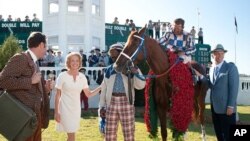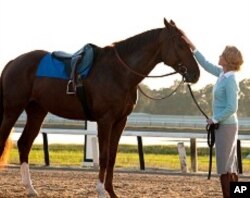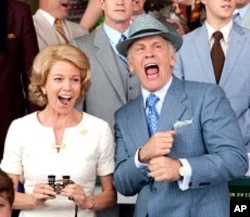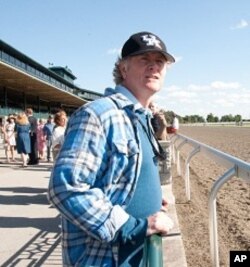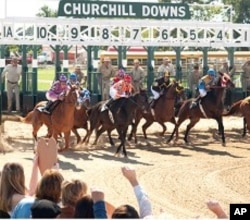Only a few horses have won the Triple Crown, three grueling thoroughbred races held every spring. Some four decades ago, one horse who did achieve that pinnacle of American racing became a national hero, along with the woman who owned and believed in him, against all odds. Their inspiring story gets the Hollywood treatment in a new film from Walt Disney. Here's a look at Secretariat.
"Horse racing is unforgiving for housewives."
"It's like every other multi-million dollar gamble we housewives make every day."
Penny Chenery was a housewife and mother in Denver, Colorado in the 1960's; but when her father's ailing health threatened the future of her family's Virginia horse breeding farm, Penny took it over, stubbornly determined to put the business back on its feet. All she needed was one winning horse …and she got that in a chestnut red colt born on the farm in 1969.
"You're in a rough spot so I'll buy that horse of yours, right now: seven million dollars, all cash."
"If he does what I think he'll do, his value will double, if not triple."
"Eight million."
"No."
"You're that stubborn."
"I'm that right."
By the time he was three years old, the thoroughbred nicknamed "Big Red, but formally called "Secretariat," would earn a place in American horse racing history. So too did Penny Chenery, as one of the few women among the owners of horse racing stables. Diane Lane plays her in the film and says she learned about the character first-hand.
"First of all, it was very surreal to spend time with the real Penny Chenery because, invariably, it is unusual to spend time with somebody that you are going to be bringing to the screen," noted Lane. "It raises the stakes. I really personally wanted to make it a gratifying experience for her.
"I don't think that Penny ever took on or saw herself in a vainglorious manner at all representing any gender or any generation. It was, rather, a timeless story from her point of view of her family business and what needed to be done to save it," added Lane. "So I take a page from her book and salute her for not letting this become an issue, but more one for the history books for people to, with the patina of time, say 'well, there is a hero.' "
John Malkovich plays Lucien Laurin, the horse trainer who, at Penny's urging - and guided by her unflagging faith in him - pushes Secretariat on to victory.
Movies about horse racing have been done before; for instance, in 2003, the Depression-era hero Seabiscuit was the subject of a hit film. So Secretariat director Randall Wallace says he set out to show the grueling and sometimes dangerous sport from a different perspective.
"I understood about this movie from the beginning that we had to experience these races as participants, not as observers," Wallace explained. "That required that we shoot the movie in a way no horseracing movie had ever been shot …with an approach of filming where you are subjectively in the race. You are not seeing what it is like to have watched "Secretariat" run; you experience what was it like to run like "Secretariat." There is a world of difference in that and we had to understand what it was like for the characters when they were alone. Some of the most evocative moments in this movie, for me, are when the characters are by themselves."
Wallace put the viewer "in the races" by shooting them with lightweight video cameras mounted right on the horses. Of course, horse racing fans know the results of the 1973 season when "Secretariat" won the Triple Crown; but director Wallace contends there is still suspense and a sense of religious exultation about the outcome of the film.
"In all of my other films - Braveheart, We Were Soldiers, Man In The Iron Mask - along with courage and honor there is a sense of tragedy," Wallace said. "This was a movie in which it is unalloyed joy that glories in love and courage."
Secretariat reinforces that religious tone with lines from the biblical book of Job at the beginning and the 1969 hit version of the Christian hymn "Oh Happy Day" at its climax. The book Secretariat: The Making of A Champion by journalist Bill Nack is among the sources for the script by Mike Rich.




